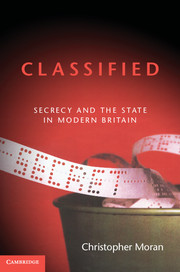Book contents
- Frontmatter
- Contents
- Illustrations
- Foreword
- Acknowledgements
- Abbreviations
- Introduction
- Part I 1889–1945
- Part II Secrecy and the press
- Part III Secrecy and political memoirs
- 6 Cabinet confessions: from Churchill to Crossman
- Part IV Intelligence secrets, spy memoirs and official histories
- Notes
- Bibliography
- Index
- Plate section
6 - Cabinet confessions: from Churchill to Crossman
Published online by Cambridge University Press: 05 April 2013
- Frontmatter
- Contents
- Illustrations
- Foreword
- Acknowledgements
- Abbreviations
- Introduction
- Part I 1889–1945
- Part II Secrecy and the press
- Part III Secrecy and political memoirs
- 6 Cabinet confessions: from Churchill to Crossman
- Part IV Intelligence secrets, spy memoirs and official histories
- Notes
- Bibliography
- Index
- Plate section
Summary
I am firmly convinced that posterity has everything to gain and nothing to lose from the publication of the struggles, the failures and the successes of a lifetime devoted to the development of our system of Cabinet Government, whether for peace or war.
Sir Maurice Hankey,30 May 1957In Chapter 2, we saw how the secret state, in the inter-war period, struggled to prevent the disclosure of sensitive information in the autobiographical writings of senior statesmen. More often than not, officials were rebuffed by authors who had a mind of their own about how the ‘rules’ should be applied, if at all, in their case. This chapter takes the story up to the seminal Crossman Affair in the mid 1970s, where the government made a controversial and ill-fated attempt to use the courts to block publication of the late Richard Crossman's diaries, to the delight of the chattering classes and advocates of open government. The thirty years or so following the end of the Second World War represented a particularly difficult time for secret-keepers charged with stopping politicians from doing too much damage in their reminiscences. Just as before, many of the individuals in question were loath to cooperate, believing themselves to be above common law and the common man. Former prime ministers expected and received the most preferential treatment, but this, in turn, only served to embolden those lower down the ladder to demand similar leeway.
The chief problem that surfaced in this period was that retiring ministers were less inclined to be dilatory in writing their memoirs, desiring to produce ‘instant history’. Fewer politicians were leaving the political stage with their reputations intact – a reflection perhaps that politics itself was becoming more heartless and unforgiving. For failure-stained individuals like Anthony Eden, desperate to alter the trajectory of public opinion, there was no time like the present. Moreover, there was more money to be made out of immediate material, with publishers and newspapers keen to provide a news-hungry public with the ‘inside’ story on those who occupied positions of power. As Whitehall saw it, in leaving only a small distance between the publication date and the events and people described, authors posed a direct challenge to the Westminster system of government.
- Type
- Chapter
- Information
- ClassifiedSecrecy and the State in Modern Britain, pp. 205 - 252Publisher: Cambridge University PressPrint publication year: 2012



